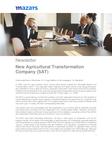
New Agricultural Transformation Company (SAT)
In 2003, Law 811 was enacted, which, among other things, created the “Sociedad Agraria” the Transformation ("SAT"). This corporate model, imported from Spain (where it has had good results), was intended to "find a legal formula for productive association that would overcome the defects, limitations and inflexibilities of the centuries-old agricultural cooperatives and the various types of civil and commercial companies, including consortiums" (Freay López, J.L., 2004).
The SAT is conceived as a commercial company, but with cooperative features; its main purpose is not the distribution of profits (and it requires a qualified majority to be able to do so), no partner may hold more than 33% of the capital (49% if it is a legal entity) and it must have a board of directors that may have up to 11 seats, with their corresponding alternates.
This solution has some advantages over the cooperative, such as being able to distribute its profits and having fewer members than the cooperative (10), including legal entities. However, due to the lack of dissemination and the lack of real incentives for their adoption, according to Arturo Rey (2020), as of November 2019 there were only 18 SATs in force in Colombia.
The SATs have some interesting institutions, not seen in other types of companies, such as the express mention of the duties of the associates, a special system for challenging corporate decisions and the possibility of creating groups of SATs that have the capacity to contract without constituting - per se - a legal entity. A tax incentive was also created in such regulation, consisting of in that the Government would "promote" that transactions of perishable products of vegetable and/or animal origin without transformation prior to their consumption be exempted from withholding tax. Although the Government may do so autonomously, it has not yet "sought" to make this tax benefit effective.
This corporate figure must be rescued, because now - more than ever - a legal vehicle is needed to take advantage of the tax benefits that exist for investment in Colombian agriculture and to standardize labor formalization and compliance with tax and parafiscal obligations. For this purpose, some members of the Institute of Corporate Analysis (@iasocietario) and the Center for Fiscal Innovation (@ciflatam) have joined efforts to design and propose what would be a revised and simplified SAT that meets the above purposes.
Within the discussions that have been held to date, there has been consensus that some of the incentives that should accompany the incorporation of this type of companies is the possibility of transferring -via dividends-, to its shareholders, the exempt income from investments in agriculture, obtain preferential financing quotas for agricultural projects, have a competitive advantage (preferential) when selling food products to the Government, not be required to renew commercial registration (only those SAT that sell crops and livestock in natural state -C. de Co. Art. 23(4)-, or that do not carry out commercial activities) and are allowed the deductibility of expenses incurred in improving the quality of life of their "stakeholders". As consideration for all these benefits, the new SATs will have to be constituted as companies of collective benefit and interest (BIC) and keep such quality.


